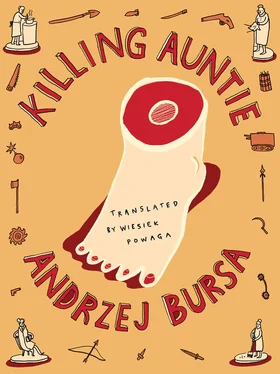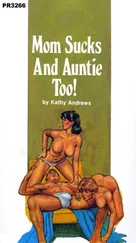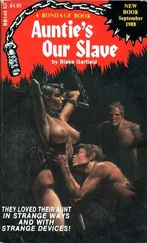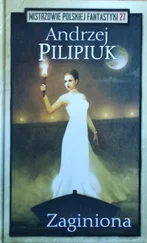“Poor thing, I’m scared.”
“Why?”
“I’m always scared before your training.”
“Don’t worry. It won’t be for much longer now.”
“What makes you think it won’t be for much longer?”
“I’m sure of it, my little one. Before I met you, I didn’t believe my life could change in any way. And I accepted that. In fact, it never bothered me much. But now, when I’m involved in such an extraordinary affair … Just think, Jerzy, it’s amazing …” She fell silent and, after thinking for a while, she added with conviction: “I just know that everything will turn out as you want.”
I waved my hand wearily. I knew that Teresa didn’t really understand any of it. But her optimism and unbounded faith in me began to disturb me. When we plotted our escape, planned our travels and other adventures, I usually put forward the most bizarre, fantastic ideas. I could even find logical arguments for them. And the down-to-earth, practical Teresa fell for my fanciful nonsense. As long as we believed in it together, it was all very nice. But now I was struck by what an enormous distance separated me from those moments. Did it mean I was bored with love? Probably not. I needed Teresa, I wouldn’t want to lose her. Yet I realized with absolute clarity that the only real thing was the corpse, at once a millstone around my neck and my lifeline.
I CHECKED THE TIMETABLE AND REALIZED THE BETTER OPTION would be to return by bus. Any other time I would have been disappointed, but today the prospect almost pleased me. I was disappointed by The Other Town. I tried to shorten the wait for the departure by discovering something special about buses. Unfortunately, I couldn’t find anything special. Their shape and yellow headlamps just didn’t fit into any metaphor. They were horrifying. But only in their objective existence. I turned my eyes to the station clock, hoping this poetic object might retain something of the fairy tale I’d expected from The Other Town. I looked at it intensely, lingering on the bright little star at the top. Still, I felt I was losing my focus despite putting all my imagination and intelligence into the effort. Suddenly I heard the characteristic blare of a horn and at the same time, maybe just a few seconds before, a young voice:
“Careful, mister!”
Someone yanked my arm. I let myself be pulled back. A few inches before my eyes passed a bus. I turned around towards my rescuer and recognized The Girl I Used to See. Before I could get my bearings and get out of harm’s way, I stood in the middle of the road used by buses returning to the terminal. I had already grasped the meaning of this laconic message. Not for the first time The Girl interrupted my most carefully laid plans of suicide, which returned later only with double force.
I took my seat by the window and tried to adopt a position that would allow me to spend the long journey in the best possible comfort. I focused my mind on that. As the driver switched the engine on, someone sat next to me. I turned my head automatically. It was The Girl I Used to See. I shuddered. I turned my head away and fixed my eyes on the window. This situation required some reaction on my part. I was trying to persuade myself that fate had graciously given me a chance. But then, I knew I couldn’t take it, and felt rather ungrateful towards my fate. In the end I reached a compromise that best suited my mixed feelings: by observing The Girl I would destroy the myth of her Otherness, which in the meantime I had cultivated in my mind. Until now, almost always, I had seen her from a distance. Now that my face was practically next to hers, I would discover how common she really was.
I observed The Girl closely. Pretending to stare absentmindedly through the window, I studied her reflection in the windowpane, her profile, her hands; I looked for signs of weariness in her face, which would make her just like the other passengers. After a while I could conclude with satisfaction that The Girl was tired; she even yawned once. And yet I felt defeated. The Girl still managed to retain the mystery of previous encounters. The distance I felt then did not diminish now, when our shoulders pressed against each other in the shared misery of fellow passengers. Her remoteness could be punctured only by talking to her directly. At first I thought of starting a casual conversation, in the course of which I would defeat her apparent unavailability. Except I wasn’t really sure that victory would be mine. After all, talking to strangers had never been my forte. I cursed the situation forcing me into this. At that moment it was no longer just a question of destroying her myth but of wasting the chance — the chance I had already forfeited. I was not afraid of embarrassment. I was simply too lazy to undertake such a great effort. The thought of having an empty flat at my disposal disarmed me completely. And yet I was not ready to surrender. I could only console myself that in a couple of hours we would reach Our Town and The Girl would disappear around some street corner. That thought actually hurt. I counted the short stops bringing that moment inexorably closer. Suddenly I hear a loud crash and the bus ground to a halt.
The driver jumped out of his cabin and shouted something after a short while. Slowly, people started to leave the bus. I got moving too. The driver and the conductor were walking around the bus with their flashlights. It looked like something serious. Passengers complained and murmured among themselves. They looked like a lost herd of sheep; the sight cheered me up a little. We all stood by the roadside, close to the bus. Almost all the men lit cigarettes. I looked around thoughtlessly and suddenly saw a slender figure marching down the road with light, confident strides. It took me awhile to realize it was her. The Girl’s movements were so strikingly different than the rest of the passengers, showing no sign of nervous impatience about the delay. It was hard to believe she belonged to the mass of commuters shuttling between the towns. The moon had just lit the road; there was no danger of me losing sight of her again. Some people began to walk around in small circles, as if locked in an invisible cage. Others took advantage of the bushes on both sides of the road.
I joined the walkers for a while and then broke away to follow The Girl. We left the bus far behind. The Girl marched on, her pace steady and purposeful, as if she knew exactly where she was going. We passed a wooden building, then a birch tree. The road began to rise. I expected that once The Girl reached the top of the hill she would turn around and start coming down. I stepped out of the shaft of light and over to the side. But she marched on. For a moment I lost sight of her. I hurried up a little. I was beginning to enjoy this. Suddenly I heard a roar. Its muffled sound confirmed we had covered quite a distance. Then another roar. After a while I heard the quiet purr of an engine. The Girl stopped and spread out her arms undecidedly. For a few seconds she stood still, as if struck by the moonlight. Then, slowly, she lowered her arms and just as undecidedly turned around. At first she walked slowly, like someone out for a stroll, then she broke into a run. I stepped out of the dark and walked toward her. As she passed me by I said:
“The bus is gone.”
She stopped dead in her tracks. She looked at me carefully, without fear, and asked sharply:
“Who are you?”
“Ah … Mm…” I stammered. At first I wanted to say, “A murderer,” for at that moment that was the most important thing about me. But I bit my tongue.
“A passenger,” I said at last.
We began to walk slowly, following the direction in which our bus disappeared. We walked, picking up the pace, without looking at each other. The icy winter road, carrying us forward like a conveyor belt, the white downy fields, clusters of houses and lonely trees marked the rhythm of our march. The moonlight shone all the time. Now and again a hare skipped across the road. I was getting tired. The march, at first a relief from the murderous seat on the bus, was now beginning to turn into another type of torture. A slight nagging discomfort in my shoes and clothes grew sharper and more painful with every step. My feet began to slip. I stole a glance at my companion, wondering if she too had reached the point of exhaustion. But The Girl’s clear face seemed just as untroubled as it was on the bus. I had no idea how far Our Town was, or whether it was at all possible to get there on foot. Several times I wanted to ask The Girl but I couldn’t bring myself to do it, fearing that such questions were ridiculous in light of the merciless pace of our march, the road, the moonlight and the monotony of the landscape. When we passed the fourth village the road turned into the woods.
Читать дальше












